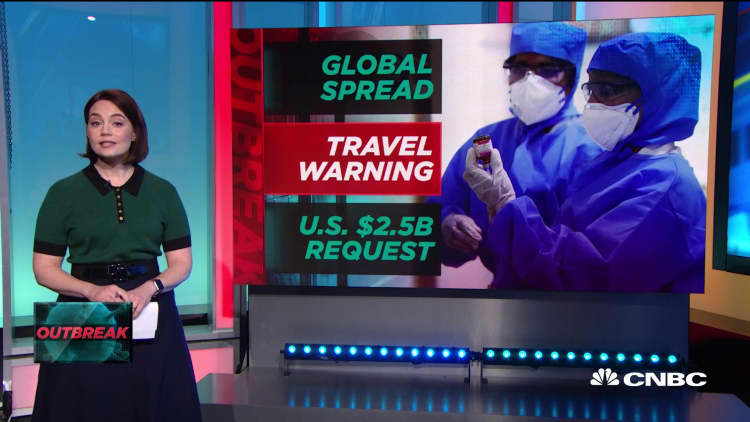In the United States, there are currently 60 confirmed cases of coronavirus, aka COVID-19, in six states. The Centers for Disease Control confirmed the first possible community spread, or a case of unknown origin, in California on Wednesday.
The virus that first started in Wuhan, China has infected more than 80,000 people and killed at least 2,700 globally. The World Health Organization has yet to declare COVID-19 a pandemic.
Nancy Messonnier, head of the National Center for Immunization and Respiratory Diseases at the Centers for Disease Control and Prevention, said Tuesday that people in the United States should prepare for the virus to spread in communities.
"It's not so much a question of if this will happen anymore but rather more a question of exactly when this will happen and how many people in this country will have severe illness," Messonnier told reporters.
For example, Messonnier suggested that parents think about how they would handle childcare of school closures. "For adults, businesses can replace in-person meetings with video or telephone conferences and increase teleworking options," she added. (In Japan, which currently has at least 800 cases of coronavirus, Prime Minister Shinzo Abe said on Thursday that the government would ask all schools to close for most of March, according to Reuters.)
COVID-19 is believed to spread through respiratory droplets that pass when an infected person coughs or sneezes, according to the CDC. Symptoms of COVID-19 include a fever, cough and shortness of breath, and they can appear two to 14 days after exposure.
Here are the steps that experts say would be helpful now before COVID-19 spreads in the U.S.:
Figure out your work situation
It's a good idea to have a plan with your workplace about what would happen if work was interrupted due to a public health mandate, Scott Weisenberg, MD, director of the travel medicine program at NYU Langone Health tells CNBC Make It. For example, do you have the equipment necessary to work from home if you couldn't leave for the office?
The CDC says that businesses should have a way to communicate outbreak response plans to employees. "Anticipate employee fear, anxiety, rumors, and misinformation and plan communications accordingly," the CDC's website says.
If necessary, the CDC also recommends that businesses explore strategies that would decrease the amount of exposure that people have with one another, for example, telecommuting and staggered shifts. Those who travel frequently for business should also consider cancelling any nonessential travel in the case of a sustained outbreak in the U.S.
Know how to get in touch with doctors
It's a good idea to know how to access your own healthcare system virtually, in case you're too ill to visit a medical facility, Dr. Weisenberg says. Establish a line of communication with your healthcare providers, through a patient portal or video chat, in advance so you're not waiting until the last minute, he says. You should also know how to access your state or territorial health department's website, so you can stay well-informed of any news or advisories.
Continue washing your hands
"The best thing we can do is practice prevention in all forms and fashions," Rachael Lee, assistant professor in the division of infectious disease at University of Alabama School of Medicine, tells CNBC Make It.
It's still important to follow standard respiratory hygiene practices, such as washing hands with soap and water for at least 20 seconds or using an alcohol-based hand sanitizer, the CDC suggests. Refrain from touching your face with unclean hands, because the eyes, mouth and nose are all portals for the virus, she says.
Cover your cough or sneeze with a tissue that you can throw away. If you're sick, you should stay home and keep "high-touch surfaces" in your house clean with household cleaning spray or wipes, according to the CDC.
And if you haven't gotten your flu shot yet, it's still a good idea to get one, because influenza cases can spread through March, Lee adds.
Shop for the essentials
While many people have taken to buying and wearing masks to prevent coronavirus, wearing surgical masks will likely not protect you from contracting COVID-19, Lee says. Specific masks, called N95 respirators, reduce exposure to small particles and droplets, and are recommended for health care professionals, caregivers and those with disease symptoms, she says.
However, you might want to go buy shelf-stable food to have in your home that could last you a few days, Lee says. "I think it is helpful to have a small amount of food available for anything in general, just as part of emergency preparedness," she says.
Check out: The best credit cards of 2020 could earn you over $1,000 in 5 years
Don't miss:



